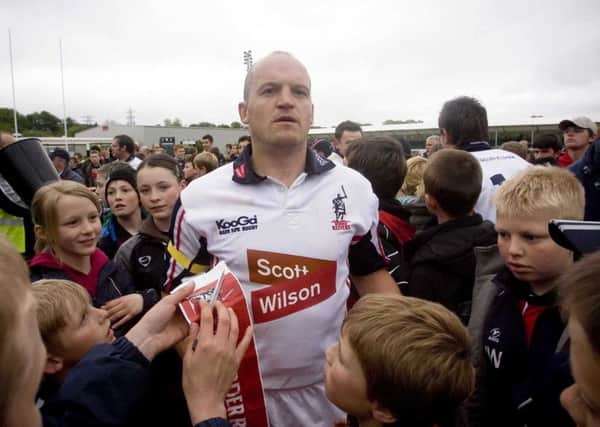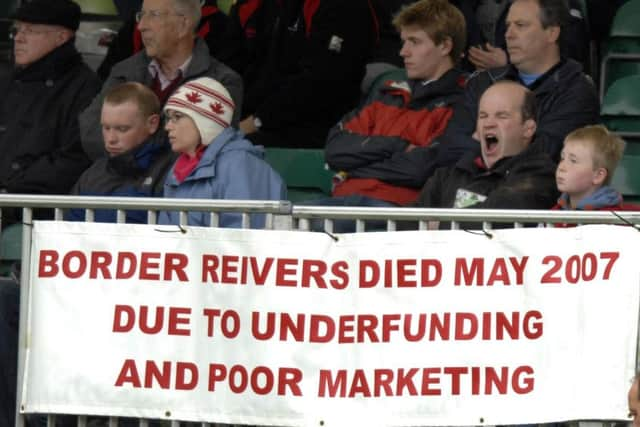Ten years on: Gregor Townsend on the Border Reivers' demise


The Glasgow Warriors coach, who will become Scotland boss on 1 June, reflected on the disappointment he felt a decade ago as the team, which was based in his hometown of Galashiels, was axed at the end of his playing career, the last match being against Ospreys at the end of the 2006-07 season, but believes the decision has been proved correct over time.
One of the effects of ending the Reivers, who operated from 2002 to 2007, was extra funding for Glasgow Warriors and that has borne fruit with a Guinness Pro12 title and, this season, a first-ever European Champions Cup quarter-final, in which they face holders Saracens next Sunday. Townsend believes that the professional game in Scotland is now in much better health and is adamant that there remain opportunities for young Borderers to make it as professionals.
Advertisement
Hide AdAdvertisement
Hide AdThe loss of a third professional team has obviously limited the number who get to experience top-level rugby each week, with the national Sevens set-up, games with BT Premiership clubs and a tie-up with London Scottish the other avenues on offer.


Townsend reckons the new BT Sport Scottish Rugby Academy system, which has a centre in Galashiels, means youngsters from the south can still aim high.
“I still see players from that area doing very well,” said the former Scotland and Lions stand-off. “The double winner of the Six Nations Player of the Championship is from there!
“There are a number of players coming through. [Hawick and Scotland U20 full-back] Darcy Graham is from the same town [as Hogg] and he has a pro contract with Edinburgh. Kelly Brown went on to captain Scotland, so did Greig Laidlaw. These are high-profile players. Ross Ford has been playing for Scotland for ten years.
“A number of young Borderers will still come through. Having a regional academy based in the Borders does give access to support between 15 and 18, before they are picked up by a pro team and that will help.”


When rugby went professional in the 1990s, Scotland initially had a structure of four districts – Glasgow, Edinburgh, Caledonia and Scottish Borders – before creating two “superteams” in the late 1990s.
The Glasgow Caledonia Reds and Edinburgh Reivers struggled to find an identity and, in 2002, the third pro team was created. However, the Border Reivers struggled both on and off the field and lasted only five years.
“The pro teams are much more competitive now,” said Townsend. “I think there was one season when Edinburgh, Borders and Glasgow were the bottom three teams in the [ten-team Celtic] league [before the Italian teams were introduced] and that has not happened since.
Advertisement
Hide AdAdvertisement
Hide Ad“It [the Borders] didn’t work. I was disappointed that it didn’t work but it obviously wasn’t going to work. The financial model of a small town competing against clubs in the cities that we now compete against wouldn’t work.
“I wish it could have worked better when it was there, but it didn’t because we weren’t getting the crowd numbers. Where we are now is much more sustainable. Also, the quality of the player is coming through.
“Scottish Rugby has invested in the two pro teams. While it hasn’t been perfect over the years, there was a lot of pessimism about whether professional rugby could survive in Scotland. But it is thriving now. We have only failed to sell out one game here this year, by about 100 people.
“You know that 7,200 people were not turning up at Borders games back in those days – or to Edinburgh and Glasgow. It is a much healthier and better position than we have been in since 1996 when the game went pro.
“We are in a much better situation now than 20 years ago in terms of the number of players playing in Scotland. There were more exiles in the Scotland set-up back then than there is now.”
The Borders remains the one part of the country where rugby is the No 1 sport but, as well as the loss of the pro team, the once formidable local club scene has hit some hard times. Melrose may be flying high but the only other two Borders clubs in the top-flight – Hawick and Gala – filled the bottom two berths this season.
Townsend remains resolutely optimistic about the future, though.
“Fewer are playing at the senior level, more at the mini level,” said the Warriors coach. “My boys are both involved in the Melrose set-up and you go there on a Sunday morning and hundreds of kids are playing. You go to a tournament in Hawick or Gala and you see hundreds of kids. Clubs have looked at how best to get players through.
Advertisement
Hide AdAdvertisement
Hide Ad“There is a society issue about why people are not playing at senior level, but that has nothing to do with the pro teams. That’s a society change. When I was 18 or 19 Gala had six junior clubs. Hawick had about ten. Now there are just more things to do at the weekend.
“I keep an eye on things. The Scotland U19 team had a stand-off from Hawick, Kyle Brunton. There was another player from Hawick and another from Jed. Players are still coming through.”
Hogg was a keen supporter of the Reivers as a youngster, even acting as a ballboy and recalling “drying the ball and handing it to Ross Ford”.
“Now, being a wee bit more grown up, I can understand everything that happened but at the time I was pretty disappointed to see it happen,” said Hogg, pictured below. “It would be great now if the Borders were still going but these things happen. Unfortunately it is no longer there.
“Growing up, the first thing you wanted to do was play for Hawick. The Borders were up and running at the time and it was a target to be a professional rugby player.
“I remember my family, the four of us, me, my father and mother and brother, would go and sit bang on the halfway line in the temporary stand on the far side of the [Netherdale] field. I was either there or on the touchline as a ballboy. We were a huge part of support for the Borders and it is a great shame that it is no longer there.
“I am proud to be a Hawick man. Proud to be a Borderer. It is something that drives me every day doing it for people back home.”
Hogg added: “The new academies are perfect. Some of the best talent in the Scotland teams just now come from the Borders. Greig, Fordy, myself, Darcy getting his contract at Edinburgh. Hawick boys are doing well.”